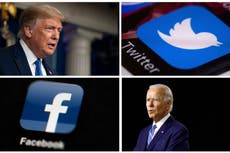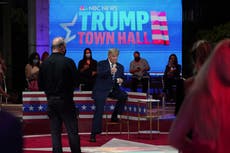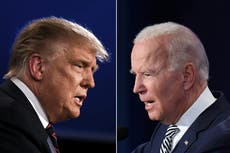Trump, Biden and masculinity in the age of coronavirus
Trumps recovery from coronavirus is being used as another example of the President’s psychical strength by supporters
President Donald Trump boasted last week that he beat Covid-19 because he is "a perfect physical specimen." Sen. Kelly Loeffler, R-Ga., distributed a video of Trump at WrestleMania, tackling and beating up a man with a coronavirus particle superimposed over his head.
"President Trump won't have to recover from COVID," Rep. Matt Gaetz, R-Fla., wrote on Twitter. "COVID will have to recover from President Trump."
The president's emergence from his bout with the novel coronavirus is being hailed by many allies as a sign of his physical strength – the latest chapter in the effort by Trump and his supporters to cast himself as the manliest of men, conflating masculinity and strength and engaging in a dispute of sorts with Joe Biden over the meaning of machismo.
"Now, what is this macho thing: 'I'm not going to wear a mask'?" Biden said during a town hall meeting last week, held just after Trump was released from the hospital. "Big deal. Does it hurt you? Be patriotic, for God's sake. Take care of yourself, but take care of your neighbours."
In response to Biden encouraging Americans to wear a mask, Fox News commentator Tomi Lahren wrote on Twitter: "Might as well carry a purse with that mask, Joe."
The back-and-forth between Trump and Biden has long resembled a testosterone-filled, mano-a-mano bluster between the high school jocks they used to be. They evoke different brands of manliness – an old-fashioned machismo for Trump, a manly but caring boy-next-door for Biden.
Trump's recent experience with the coronavirus has amplified that conflict, which in some ways is a fight over what strength means in a changing society. Physical strength is obviously not synonymous with maleness, but Trump often uses it as part of his broader self-portrait as a dominant masculine figure.
"Trump is a more caricatured version of masculinity – aggressive, physically tough, physically strong, never back down," said Jackson Katz, creator of a forthcoming documentary called "The Man Card: Presidential Masculinity from Nixon to Trump." "What Biden is offering is a more complex 21st-century version of masculinity. It's compassion and empathy and care and a personal narrative of loss."
Trump has embraced a stereotypically macho persona since long before his presidency. He joined forces with WWE, the professional wrestling organisation. He posted images of himself as fictional prizefighter Rocky Balboa. For a time he co-owned the Miss Universe Organisation, with its stereotypical notions of men judging women's appearance.
In a 2016 primary debate, Sen. Marco Rubio, R-Fla., became involved in a back-and-forth with Trump about the size of their hands, and by extension the size of their genitalia, something Rubio later said he regretted.
"What we learned in 2016 is it's all about those moments when Trump comes after you and how do you handle it," said Alex Conant, who advised Rubio in that campaign. "He was just throwing out insults and mocking people. It turned out to be really effective. It worked for him. I don't know that would work for another politician."
In this campaign, Trump has gone directly at Biden's physicality, accusing him with no evidence of taking performance-enhancing drugs and depicting him as frail and slow.
Like many messages associated with Trump, the chest-beating can be over the top. Republicans last month distributed a video of Trump issuing an expletive-laden warning to Iran that included images of a bear growling, Hulk Hogan ripping off his shirt, a nuclear bomb erupting, fireworks exploding, an eagle screaming and the phrase "BEAST MODE" flashing across the screen.
Biden has done nothing like such antics, let alone Trump's bragging about grabbing women by their private parts.
One of Biden's political calling cards is an expression of empathy with voters, and unlike Trump, he is not afraid to show vulnerability in public. He often tears up as he speaks of his son, Beau, who died in 2015. He talks of his childhood stutter and how he worked to overcome it. He has spoken in the past of contemplating suicide after family tragedy. He refers to the grief he felt when his first wife and daughter died in a car crash.
But despite Biden's self-branding as a more contemporary man, he can fall into an old-fashioned swagger.
Pressed last year to release his medical records to assuage concerns about his health, he first challenged the premise – "What the hell 'concerns,' man?" – and then challenged the reporter: "You wanna wrestle?"
When an 83-year-old Iowa farmer questioned his fitness during the Democratic primary, Biden interjected, "Let's do push-ups together here, man. Let's run. Let's do whatever you want to do." He talked recently of how he would want to take Trump "behind a barn somewhere" if the two weren't presidential contenders.
More strategically, the Biden campaign has run ads in Pennsylvania featuring a man with tattooed arms tossing a football with his son and talking about the importance of sports – and of his support for Biden. Other Biden ads have been compared to Ford F-150 truck commercials, with upbeat electric guitar and a gravel-voiced narrator.
It's not clear how much traditional displays of masculinity still resonate with voters, as women take on increasingly prominent roles and old stereotypes fall by the wayside. From Congress to the Supreme Court, from business to sports, women occupy increasingly powerful positions that are challenging older images of leadership and power.
"The culture is changing and becoming in some ways more like Biden," Katz said. "But Trump still clearly has a large appeal to men who understand the more traditional appeal of aggression, physical strength, the willingness to authorise violence."
Both Biden and Trump are targeting a swath of White working-class voters in the industrial Midwest, many of whom may have traditional social values. Biden allies think his blunt, relatable style allows him to connect with such voters; Trump's supporters believe his aggressiveness showcases him as a powerful leader willing to bowl over anyone in his way.
Four years ago, gender dynamics attracted enormous attention in the presidential race, especially in the debates when Trump faced off against Democratic nominee Hillary Clinton. Those dynamics are not absent from this year's contest, in part because Biden has chosen a woman, Sen. Kamala Harris, D-Calif., as his running mate.
During the recent vice-presidential debate, Vice President Mike Pence repeatedly spoke over Harris. "Mr. Vice President, I'm speaking," Harris said several times, a phrase that within minutes was being sold on T-shirts by supporters.
Philippe Reines, who played Trump in Clinton's 2016 debate practice, said he would stand close to Clinton and try to rattle her by saying things like, "Are you okay to keep going?" Trump did not use those techniques during the debates, but he moved around the stage in a way that some Clinton supporters felt was meant to intimidate.
"Donald Trump relies on his size. It's not as simple as height," Reines said. He noted that Trump is said to weigh about 240 pounds: "That's a presence. I think he uses it."
In his first debate with Biden – which Trump told the Washington Examiner beforehand would be like a "prizefight" between "gladiators" – Trump appeared determined to dominate both Biden and moderator Chris Wallace, repeatedly interrupting them and ignoring time rules. Polls suggest the performance cost him support.
But the Trump-Biden chest-thumping dates back even to before Biden was the Democratic nominee. At an anti-sexual-assault rally in 2018, Biden told a crowd at the University of Miami, "If we were in high school, I'd take him behind the gym and beat the hell out of him." He later expressed modest regret for the comment.
"I've been in a lot of locker rooms my whole life," Biden added. "I'm a pretty damn good athlete. Any guy that talked [the way Trump does] was usually the fattest, ugliest SOB in the room."
At the time, Trump had a rejoinder.
"He is weak, both mentally and physically, and yet he threatens me, for the second time, with physical assault," Trump wrote on Twitter. "He doesn't know me, but he would go down fast and hard, crying all the way. Don't threaten people Joe!"
This year, when Trump started making Biden's physical and mental capacity a focus of his campaign, Biden responded by emphasising his own workout regimen and asking voters to compare the two candidates' fitness.
Biden rides a Peloton bike each morning and drinks protein shakes, and campaign aides often point toward him jogging along parade routes. Trump, in contrast, eschews exercise.
"Look at how he steps, and look how I step," Biden told the ABC affiliate in Harrisburg, Pa., last month. "Watch how I run up ramps and he stumbles down ramps. OK? C'mon."
But since returning to the campaign trail this week, Trump has resumed touting his own strength. His campaign website this week flashed an image of Trump's head superimposed on the muscular, toned body of a boxer in the ring, with a coronavirus particle dazed and fallen in the opposite corner. The caption: "President Trump crushed the coronavirus."
And the president is now talking about his ostensible immunity from the virus as a kind of superpower.
"I feel so powerful," he said recently in Florida, at his first rally since leaving the hospital. "I'll walk into that audience. I'll walk in there. I'll kiss everyone in that audience. I'll kiss the guys and the beautiful women . . . everybody. I'll just give you a big fat kiss."
The Washington Post
Join our commenting forum
Join thought-provoking conversations, follow other Independent readers and see their replies
Comments








Bookmark popover
Removed from bookmarks